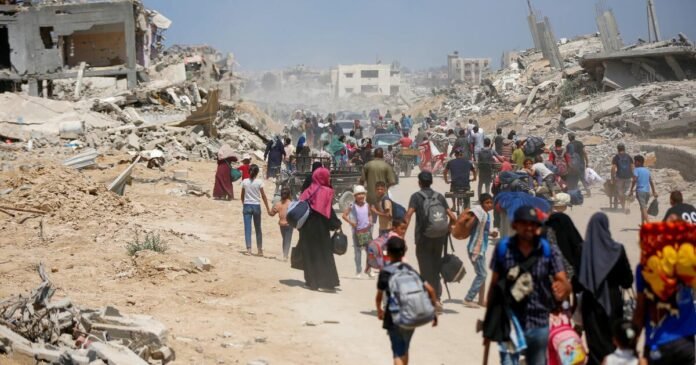The Humanitarian Catastrophe: A Crisis Unfolding
The humanitarian crisis in Gaza has reached alarming levels, characterized by severe implications stemming from the ongoing conflict. Reports from various United Nations officials and humanitarian agencies paint a stark picture of a dire situation, with alarming rates of starvation affecting the population. It is reported that over half a million people, particularly vulnerable children, are facing the threat of man-made famine as a consequence of the ongoing violence and restrictions imposed in the region.
One of the critical aspects of this crisis is the utilization of starvation as a weapon of warfare, a strategy that has come under significant scrutiny. The policies that have contributed to this humanitarian catastrophe involve blockades and restrictions that severely limit the movement of essential supplies, including food and medical aid. As a result, many families are left without access to sufficient nutrition, pushing them closer to starvation and deteriorating health conditions.
Furthermore, children bear the brunt of this crisis, with countless young lives put at risk due to acute malnutrition. The implications of this situation are profound and long-lasting, as malnutrition can lead to stunted growth and developmental delays, which may hinder children’s potential for future success. Such circumstances highlight the urgent need for international attention and action to alleviate the suffering of the affected populations.
The collective voices from within the Security Council and other international bodies reveal a growing concern over the humanitarian catastrophe unfolding in Gaza. The international community must prioritize the restoration of essential services and provide humanitarian aid without delay. This situation calls for an immediate response to address the underlying policies leading to such suffering, ensuring that humanitarian principles prevail over strategies that exploit vulnerability and exacerbate crises.
Urgent Calls for Action: The Need for Immediate Ceasefire
The Security Council has become a platform for urgent appeals regarding the humanitarian crisis in Gaza, with numerous representatives emphasizing the necessity for an immediate ceasefire. The dire conditions faced by civilians in the region have been a focal point in discussions, highlighting the critical need for a halt to hostilities to alleviate suffering. Strong, unified messages from various countries have called for an end to the violence and have reiterated the importance of a comprehensive ceasefire to permit the restoration of basic human rights and dignity for those affected.
These calls for action also include demands for swift, safe, and substantial delivery of humanitarian aid, which is vital given the current situation. Access to essential resources such as food, water, and medical supplies has been severely restricted, exacerbating the crisis faced by the civilian population. Despite various efforts, the measures taken by Israel appear inadequate in addressing the immediate humanitarian needs, leading to increased international scrutiny and pressure. The urgent need for humanitarian corridors to facilitate aid delivery has become a central theme among global leaders, underscoring the critical importance of ensuring that civilian welfare is prioritized above all else.
Moreover, the discussions have also emphasized adherence to international law, particularly the obligations that prohibit the starvation of civilians as a tool of conflict. This legal framework is crucial in evaluating the actions of any party involved in the ongoing violence, as it sets clear standards for the treatment of civilians, particularly in armed conflicts. The commitments made by various nations to uphold these laws must be reinforced with tangible actions to ensure protection for vulnerable populations. As the situation evolves, the call for a ceasefire remains an urgent matter, rooted in a deep concern for humanity and the rule of law.
Widespread Condemnation and Accountability: A Call for Investigations
The humanitarian crisis unfolding in Gaza has incited a wave of international condemnation, particularly in response to violent incidents such as the attack on Nasser Hospital. Organizations and nations around the globe have labeled this incident as a blatant assault on civilian life, highlighting the urgent need for comprehensive accountability measures. Such actions are not mere violations of humanitarian norms; they are catastrophic breaches of the principles that safeguard human dignity in times of conflict.
The attack on Nasser Hospital has shocked many, not only because of its immediate toll on innocent lives but also due to the broader implications it holds for international humanitarian law. Various states, human rights organizations, and the United Nations have called for independent investigations to scrutinize these incidents thoroughly. The emphasis on transparency and impartiality in these inquiries is paramount, as it ensures that all actions taken during the ongoing conflict are meticulously examined and reported.
Calls for accountability underscore the necessity of adhering to international humanitarian standards. Violations, especially those targeting civilians and essential services, warrant immediate action and scrutiny. The implications for the affected populations are profound; beyond the loss of life, there are lasting impacts on community health, infrastructure, and overall societal stability. Victims and their families deserve justice, and perpetrators must face repercussions to uphold the rule of law.
There is a growing realization that adequacy in addressing these violations must come from collective global responsibility. Only by demanding and achieving accountability can the international community strive towards mitigating suffering and ensuring that rights are respected. This situation calls not only for vocal denunciations but also tangible actions directed at safeguarding the rights and lives of the people caught in the midst of this crisis.
Divergent Perspectives: Responses from Hostages and Governments
In the ongoing humanitarian crisis in Gaza, firsthand accounts from released hostages illuminate the brutal realities faced by individuals caught in the conflict. One such testament comes from a former hostage who endured severe abuse and starvation throughout their captivity. Their experience sheds light on the stark human toll of the crisis, emphasizing the physical and psychological suffering that many endure in such dire conditions. This narrative is not merely an isolated incident; it reflects a broader spectrum of pain experienced by countless individuals within the region. The intersection of warfare and human rights violations raises urgent questions about accountability and the need for urgent humanitarian intervention.
The State of Palestine has framed their narrative around these human experiences, asserting the need for international recognition of their plight. They advocate for greater attention to the humanitarian crisis affecting civilians, particularly in light of the disproportionate impact on women and children. Members of the Security Council have also expressed their perspectives, with sharp variances evident among different nations. While some Council members condemn the blockade as a violation of human rights, others emphasize the necessity of security measures to protect their own citizens from potential threats.
The Israeli representative has responded by asserting that their actions are primarily aimed at self-defense, arguing that the complexities of the conflict necessitate a multifaceted approach. Their viewpoint highlights a fundamental difference in how parties perceive the humanitarian crisis—one as a byproduct of defense strategy, the other as a catastrophic humanitarian failing. This divergence in understanding reinforces the need for collaborative efforts among nations to address the underlying issues that perpetuate such devastation, focusing on peace-building and genuine dialogue to pave the way for a sustainable resolution.


